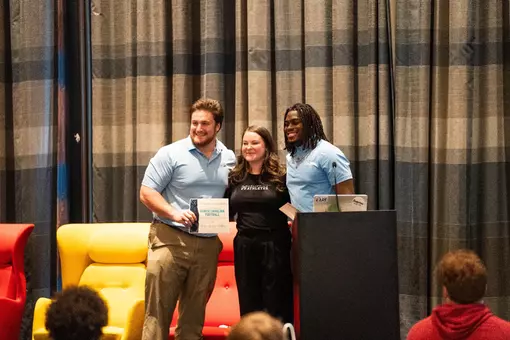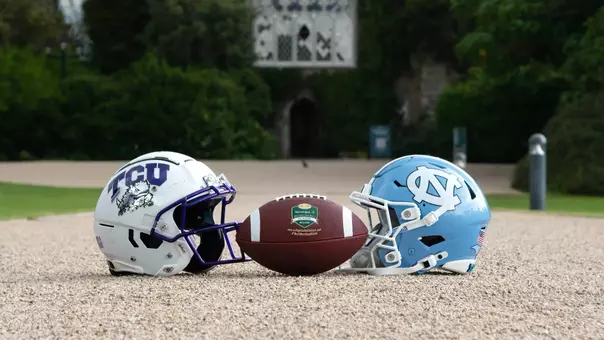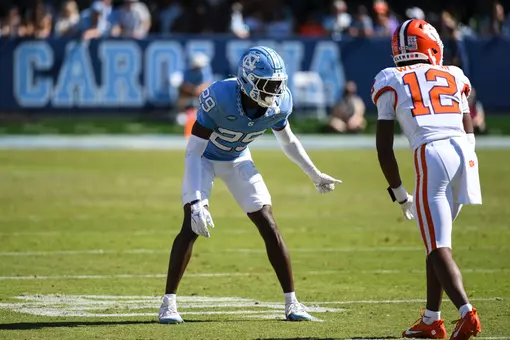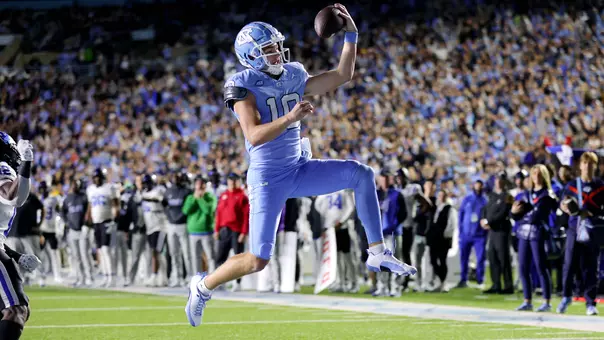University of North Carolina Athletics
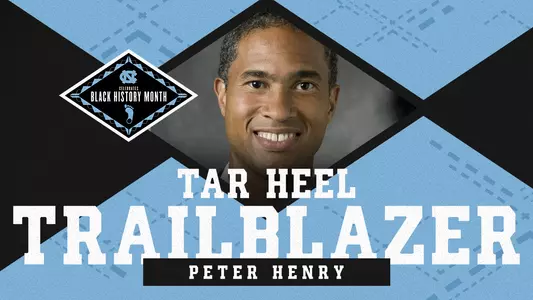
Tar Heel Trailblazers: Peter Henry
February 1, 2018 | Football, Athletics
Update, Feb. 2019:
In celebration of Black History Month, GoHeels.com will take a look back at each of the Tar Heel Trailblazers honored since 2014, with updates by Pat James.
Since stepping down as dean of New York University's business school in late 2017, Peter Henry has held the William R. Berkley Professor of Economics and Finance at the university. He's also a member of the board of directors of the National Bureau of Economic Research, Citigroup and Nike.
In October, UNC presented Henry with the Distinguished Alumnus Award.
By Pat James, GoHeels.com
Peter Henry's North Carolina football career might not have gone as he expected when he walked on in 1987.
But despite playing just two years for the Tar Heels, he said that experience and the education he received under a Morehead-Cain Scholarship laid the foundation for a professional career that's been devoted to helping people.
An expert on global economy, Henry has always been driven to assist developing nations, like his native Jamaica. Most recently, his focus has been on needy students looking to attend New York University's business school, where he became dean in 2010. He accepted the job a few days before his 40th birthday, making him the youngest person ever to hold the position.
For all this, he's been named a Tar Heel Trailblazer.
"Nothing I've done since being at Carolina is as hard as getting through two-a-days …" Henry said. "Having to compete against those guys in practice made me a better person. There's no challenge that I've faced in my professional career, whether it's been as a graduate student, as a professor or as dean, that I felt like I didn't have the mettle it took to meet it."
Henry comes from a long line of educators.
He said his paternal grandparents, who never could attend college, were school teachers in rural Jamaica. His mother and father were first-generation college students who received doctorates from the University of Chicago and the Illinois Institute of Technology, respectively.
It didn't take long for Henry to realize the value of education. But perhaps the biggest lesson of his life came at the age of 8, when his family moved from Jamaica to Wilmette, Illinois.
"I noticed there weren't so many poor people around," Henry said, "and I just started wondering, 'Why is it that in the United States people are on average so much better off than they were in Jamaica?' And that kind of got me thinking about economic issues."
He played baseball and basketball for most of his life. He longed to play football, too, but his father restricted him from doing so until Henry's senior year of high school. Still, he said that lack of experience didn't prevent Stanford, Wisconsin and Harvard from recruiting him as a wide receiver and a free safety.
Henry said he expressed interest in playing football at UNC. But when he traveled down to Chapel Hill to interview for the Morehead-Cain Scholarship, the Tar Heels hadn't shown any interest.
"I actually turned down a couple of football offers to interview for the Morehead at Carolina, which my father had some real misgivings about," Henry said. "But my mother insisted that I go interview for it."
He dreamed of going to Stanford. He didn't earn a scholarship from there, though, and he opted to walk on the Tar Heel football team after receiving the Morehead-Cain Scholarship.
Henry started his college career as a receiver. He said he then moved to tight end toward the end of his freshman year. Although he added about 10 pounds between his freshman and sophomores seasons, a preseason shoulder injury limited him for the rest of campaign and later required surgery.
He finally made the traveling team late in his sophomore season. But the next week, the coaching staff approached him about moving to outside linebacker. A decision was needed by the end of the season. His choice, while difficult to admit, was clear.
"Given what was going to be required in terms of the surgery on my shoulder and the investment of time," Henry said, "I decided for me it was going to be a better decision to focus on putting my energy elsewhere."
He stayed connected to the football team as a tutor. He served in the same role and as a mentor for local students through his involvement with the Campus Y. He wrote for Black Ink, became a resident adviser and participated in intramural sports. In 1991, he lost to former football teammate Eric Blount in the final round of the campus-wide slam dunk competition.
All the while, Henry's interest in economics grew.
After taking one economics class as a freshman, he enrolled in honors macroeconomics with professor Roger Waud as a sophomore. The course taught Henry everything he wished to understand – such as interest rates, exchange rates and investments.
That same year, he met William Darity Jr., then a UNC economics professor and now a professor of public policy and African and African-American studies at Duke University. Henry formed relationships with both professors. He often wrote to them during the summer of 1989, when he was working in New York.
"I told them I was thinking of maybe going to graduate school in economics," Henry said. "Professor Darity sent me a bunch of articles he had written, and I thought it was the neatest thing ever that you could use economics, macroeconomics and math to analyze these questions about countries' growth trajectories, unemployment, international trade. I was sold after that."
He graduated with a bachelor's degree in economics in 1991. From there, he earned a bachelor's in mathematics from Oxford University, where he was a Rhodes Scholar, and then a doctorate in economics from the Massachusetts Institute of Technology.
Finally, after graduating from MIT in 1997, he joined the faculty at Stanford.
Henry spent 12 years happily conducting research. Then in 2009, a search firm contacted him, asking if he was interested in applying for the deanship at NYU's Stern School of Business. He hesitated, at least initially.
"I said, 'I really don't want to do anything like this right now,'" he said. "But they convinced me that I might one day want to do a job like that and persuaded me to apply."
He ultimately assumed the position at Stern in January 2010. At the time, the school, renowned for its close Wall Street ties, faced questions about its viability in the middle of the global financial crisis.
But Henry helped ease those concerns.
Highlighted by the introduction of a specialized one-year Master of Business Administration program that focuses on business and technology, he led curriculum innovations that stretched beyond New York banking. He also increased the number of full-ride scholarships the school offers from zero to more than 60. First-generation minority students receive the majority.
Henry said he gained even greater knowledge of the importance of providing access to higher education for the most-qualified students, no matter their backgrounds, during his time at UNC.
"Coming out of high school, I applied to some pretty fancy schools in the Northeast and on the West Coast and I think had a narrow perspective of what academic excellence looked like," he said. "I got to UNC and there were a whole bunch of smart kids who come from the mountains, the beach and the cotton fields and tobacco fields. That really opened my eyes.
"It really taught me that if you really want to drive to excellence, you need to have a root in that conversation, you need to have people from all over the country, from all different kinds of socioeconomic backgrounds, from all kinds of cultural and political backgrounds, because value doesn't discriminate."
After eight years as dean, Henry stepped down from the position at the end of last year. He's returned to his research, looking to learn more about why some countries struggle economically and what policies can stimulate global growth.
He said he also hopes to visit Chapel Hill more often now. That begins Saturday, when he and Rochelle Small-Toney, the Class of 2018 Tar Heel Trailblazers, will be honored at an afternoon luncheon and halftime of the men's basketball game against Pittsburgh.
"For me, what this award really means is it's the recognition of the power of education and athletics to transform a person's life," Henry said. "And I say education and athletics because, yes, the academic skills are the foundation, they're the backbone. But my UNC football experience really taught me how to take what I learned in the classroom, to persevere and to really drive toward a mission.
"Without my UNC football experience, I would not have been able to accomplish the things I've been able to accomplish, to give other people access and opportunity in their lives."
UNC Gymnastics: Tar Heels Record Highest Score of Season at Cal
Saturday, February 21
UNC Softball: LeGette Walks-Off App State in Extras, 5-3
Saturday, February 21
UNC Baseball: Nicholson, Paulsen Blast Heels Over Pirates, 10-0
Saturday, February 21
UNC Men's Lacrosse: Pietramala, Duffy Pace Heels Over Johns Hopkins, 17-9
Saturday, February 21

